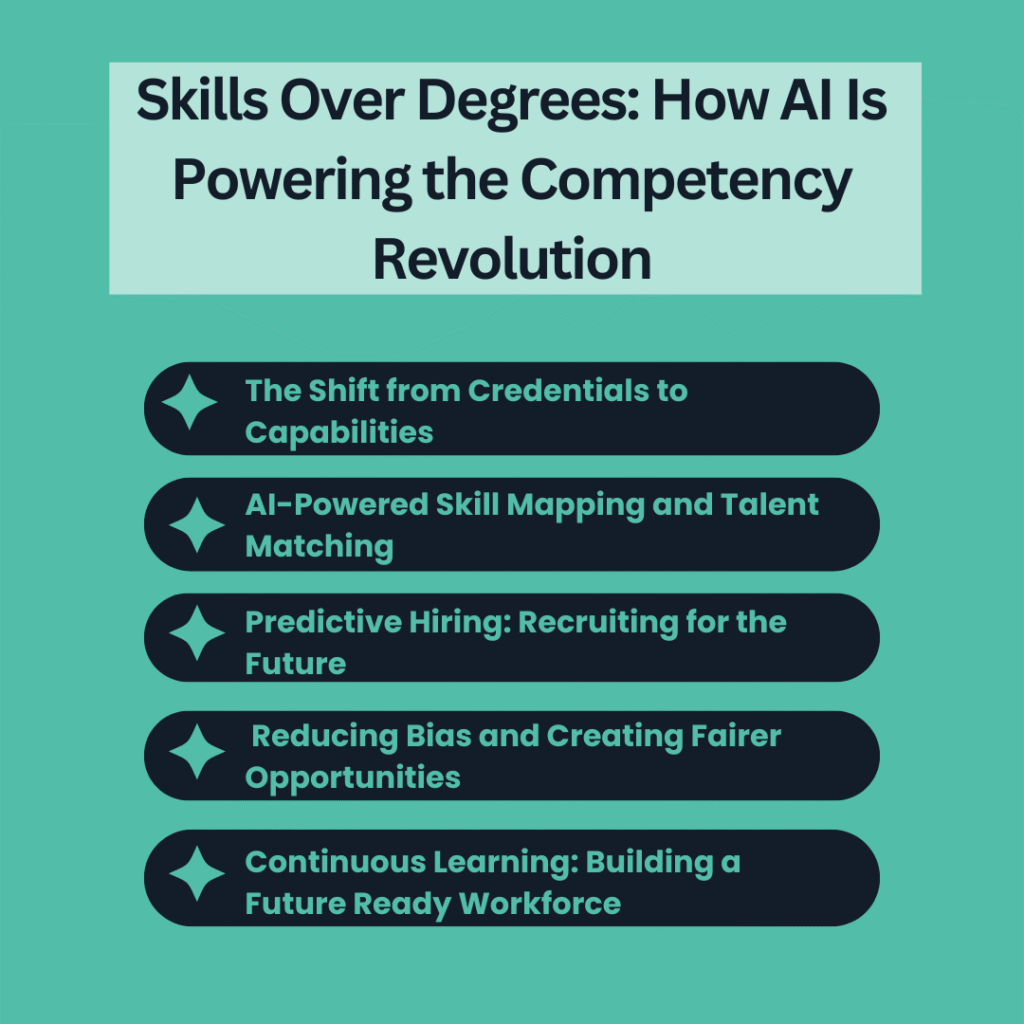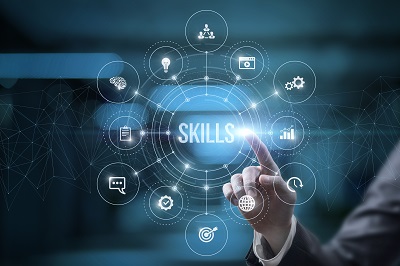There was a time when a college degree opened every door.
Employers trusted formal education as the ultimate proof of competence. But today’s tech driven world is rewriting that rulebook fast.
Artificial Intelligence (AI), automation, and data analytics are shifting how companies identify talent. It’s no longer about where you studied, but what you can do.
Welcome to the skills over degrees era where AI is helping recruiters spot talent based on real ability, not academic background. Companies like Google, IBM, and Tesla are leading this transformation by removing degree requirements and embracing competency based recruitment.
You can also read: Agentic AI Systems Future of Autonomous Task Management
In this new world of work, skills are the new currency and AI is the engine driving this revolution.

The Shift from Credentials to Capabilities
For decades, degrees were used as a shortcut to assess potential. But as industries evolve, degrees can’t always keep up with the pace of technology.
AI is changing that by helping employers focus on capabilities over credentials. Intelligent recruitment tools now assess candidates through:
- Skill based assessments (like coding or design challenges)
- Project portfolios and real world performance data
- Gamified tests that measure problem solving, creativity, and adaptability
This data-driven approach gives every candidate from self taught developers to bootcamp graduates an equal shot.
Example:
A candidate without a computer science degree but with a strong GitHub portfolio might rank higher than a traditional graduate. AI helps recruiters see talent differently and more fairly.
AI-Powered Skill Mapping and Talent Matching
Traditional hiring often relies on keyword searches and resumes both limited, biased, and outdated.
AI powered skill mapping changes the game. These systems analyze what a job truly requires and match candidates based on skills, experience, and learning potential.
AI looks beyond buzzwords scanning data from portfolios, certifications, and even social proof (like projects shared online). Machine learning algorithms then match the right people to the right roles, increasing accuracy and reducing bias.
Why it matters:
This helps companies discover hidden talent people who may have been filtered out by degree requirements but possess the exact skills needed to succeed.
Predictive Hiring
AI doesn’t just find candidates for today’s roles it predicts what skills you’ll need tomorrow.
Using predictive analytics, recruitment platforms can analyze millions of data points job trends, market shifts, and company growth patterns to forecast future skill demands.
For example, if AI detects a rise in cybersecurity threats, it can alert HR teams to start sourcing professionals with advanced security or ethical hacking skills before the demand spikes.
This transforms hiring from reactive to proactive helping organizations stay one step ahead in the talent race.
Reducing Bias and Creating Fairer Opportunities
One of AI’s most valuable contributions to recruitment is reducing human bias.
Traditional hiring can unconsciously favor certain universities, names, or backgrounds. AI driven tools, when built ethically, focus only on data that matters skills, performance, and fit.
Blind screening algorithms can remove identifiers like age, gender, or education. Recruiters then review candidates based purely on merit.
The result:
- More diversity in shortlists
- Greater fairness in hiring decisions
- Better alignment between people and roles
AI helps level the playing field giving a fair chance to self-taught learners, career changers, and candidates from underrepresented groups.
Continuous Learning
The skills over degrees revolution doesn’t stop once someone is hired.
It continues through continuous learning and AI makes this easier than ever.
AI-powered HR platforms now recommend personalized upskilling paths based on each employee’s strengths, weaknesses, and career goals.
For instance:
If an employee excels at data visualization but struggles with machine learning, AI can suggest relevant online courses, mentorships, or certifications.
This builds a culture of lifelong learning one where employees grow continuously, and businesses stay adaptable. In this world, degrees aren’t endpoints they’re starting points for ongoing development.
How to Fix
To truly embrace skill based hiring, companies need more than just technology.
They need to rewire how they think about talent.
Here’s how to make the shift:
1. Redefine Job Descriptions
Remove degree requirements. Instead, write job ads that clearly describe skills, outcomes, and measurable success metrics.
2. Adopt AI Based Skill Assessments
Use AI-driven tools to test real world skills through simulations, technical challenges, and situational problem solving not just resumes.
3. Encourage Internal Mobility
Create internal talent marketplaces powered by AI that connect employees to new roles, projects, and growth paths inside the company.
4. Ensure Ethical AI Practices
Transparency matters. Regularly audit algorithms to prevent bias and keep human oversight in every hiring decision.
5. Invest in Upskilling and Learning
Partner with digital learning platforms and make continuous learning part of your culture. This keeps your workforce ready for tomorrow’s demands.
When companies fix their recruitment mindset from degree first to skill first they open doors to innovation, diversity, and stronger teams.
Conclusion
The world of work has changed forever.
Today, it’s not about where you studied it’s about what you can do and how fast you can learn.
AI is driving this transformation, helping companies recognize real potential beyond traditional barriers. The skills over degrees revolution is creating more inclusive, future ready workplaces where talent truly shines.
Organizations that adopt this approach will hire smarter, build more diverse teams, and stay ahead in an ever changing digital economy.
The future of hiring is human + AI, fair, data driven, and skill focused.
FAQs
Why are companies shifting from degrees to skills?
Because degrees don’t always reflect real world ability. Employers are realizing that proven skills and adaptability are better predictors of success.
How does AI help identify top talent?
AI analyzes data from resumes, portfolios, online projects, and assessments to match candidates based on their actual competencies not just education history.
Can AI make hiring completely bias free?
AI reduces bias by focusing on skill based data, but human oversight is still essential. The key is using ethical AI tools with transparent algorithms.
How can businesses prepare for skill based hiring?
Redefine job roles around outcomes, use AI for skills assessments, and invest in continuous learning programs to upskill your teams.
What are the benefits of skill first hiring?
1. Faster and fairer recruitment
2.Greater access to hidden talent
3.Improved diversity and inclusion
4.Future ready employees
5.Higher retention and engagement

